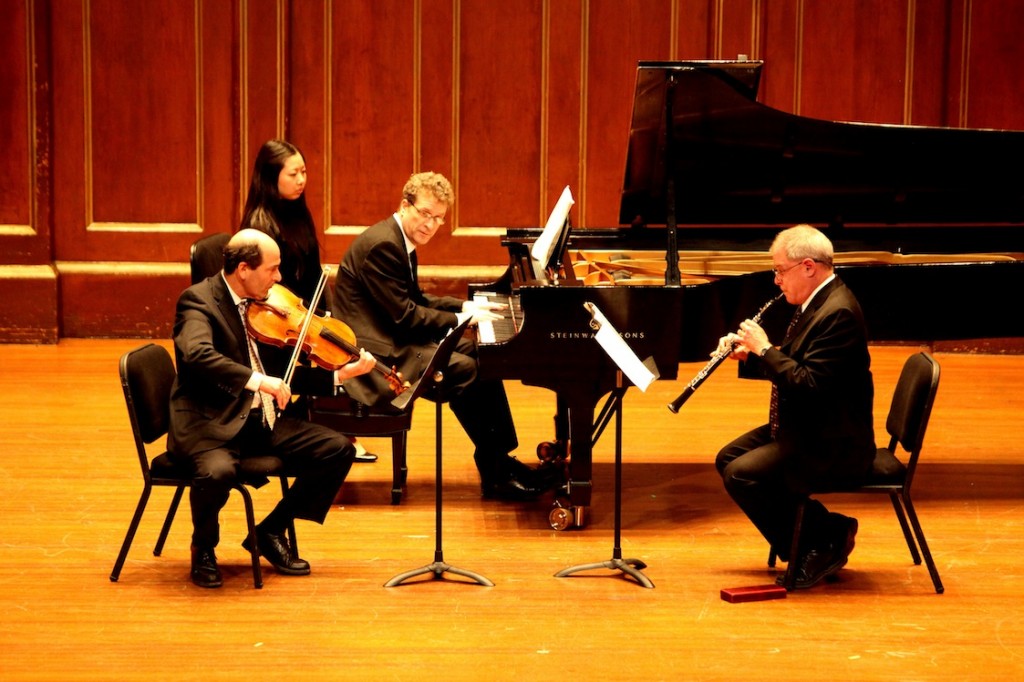Boston Symphony Chamber Players serve up musical treasure, old and new

Boston Symphony Chamber Players (oboist John Ferrillo, violist Steven Ansell and pianist Randall Hodgkinson) perform Charles Martin Loeffler’s “Two Rhapsodies” Sunday at Jordan Hall. Photo: Hilary Scott
Scratch the surface of Boston’s musical history and you will uncover a treasure trove of works by local composers that has, unfortunately, fallen into obscurity. Sunday afternoon at Jordan Hall, the Boston Symphony Orchestra Chamber Players, in celebration of their fiftieth anniversary season, resurrected once-popular but now little-heard pieces by Charles Martin Loeffler and Amy Beach.
But the concert was as much a celebration of the ensemble’s present as well as its past. Four new works commissioned by the Chamber Players received world premieres, all of which made for engaging listening.
Of those, Gunther Schuller’s Games, a dectet for strings and winds, offered a moment of light-hearted fun. At almost 90 years old, Schuller is still going strong, and as in other works in his wide-ranging corpus, Games has the characteristic clear textures, snappy rhythms, and overlapping phrases that grind against each other for spiky dissonances. In its taut, ever-evolving form, polyrhythms stack upon one another and melodic shards are passed from one instrument to another.
The most delightful aspect of this piece is its name-that-tune play on quotations from familiar repertoire. It would take more than one hearing to locate more, but hints of Rossini’s Barber of Seville, Richard Strauss’ Till Eulenspiegel, and the closing phrases of Johann Strauss’s On the Beautiful Blue Danube were easy to spot. A quotation of the final ear-bending bars of Mozart’s Musical Joke brought this exciting piece to a close. BSO assistant conductor Andris Poga led the Chamber Players in a sparkling performance.
The music of Yehudi Wyner is no stranger to the ensemble or the BSO at large. His Trapunto Junction for brass and percussion, another commission, premiered in 1990, and Wyner’s Piano Concerto for the BSO and pianist Robert Levin, Chiavi in mano, earned him the Pulitzer Prize in 2006.
Wyner completed his wind quintet Into the evening air before giving the piece its picturesque title, drawn from a poem by Wallace Stevens. It is an episodic, multi-textured affair where tranquil solo lines break into a tricky rhythmic babble between the musicians. Serenity returns, and Elizabeth Rowe (flute), John Ferrillo (oboe), William Hudgins (clarinet), James Sommerville (French horn), and Richard Svoboda (bassoon) spun graceful melodies that wove around each other. In the end, the last phrases evaporate into silence.
For Three Shades Without Angles, Hannah Lash drew inspiration from Auguste Rodin’s sculpture, Les Trois Ombres. The contorted figures in this statue, with their heads bowed in grotesque fashion, were a new take on a familiar form. Likewise, Lash’s piece combines rigorous weaving lines and the golden sonorities of Debussy’s sonata for the same instrumentation into a sinewy work. Jessica Zhou’s harp drove the music’s energy. Her cascading figures poured over deliberate and finely wrought statements from flutist Rowe and violist Steven Ansell. Their pearly blend and crisp playing gave the work bold advocacy.
Kati Agócs’ Devotions for French horn, harp, and string quintet is a wash of effects. Thin sheets of string harmonies and rippling harp figures break into gleaming episodes of glissandi and bent pitches. Elsewhere, the music seems to spin in one place.
The piece prominently features Agócs’ friend, the versatile French hornist John Sommerville. He deftly handled the wide leaps, whispered high tones, and low growls over the shimmering strings.
Bookending the premieres were works by composers who were once prominent figures in Boston musical life.
The Berlin-born Charles Martin Loeffler (1861-1935) was eclipsed by the later generation of American composers. But in his heyday, his name was a fixture on BSO programs. Loeffler had even served as violinist in the orchestra from 1882 to 1903.
As a composer, he drew from the hazy textures and languid, chant-like flow of contemporary French music rather than the heavier Germanic styles so popular among his American colleagues. That is evident in the Two Rhapsodies for piano, oboe, and viola heard Sunday afternoon.
Written in 1905, these sumptuous pieces depict poems by Maurice Rollinat. The first, L’Étang (the Pond) featured John Ferrillo (oboe) and Steven Ansell (viola) in keening phrases. Randall Hodgkinson’s gentle touch for the rolling arpeggios on the piano gave the pond depicted in this music the feeling of a rippling stream. In La Cornemuse (the bagpipe), Hodgkinson and Ferrillo traded graceful melodic turns. These wafting melodies, tossed between the musicians, melted into passages of lyrical warmth.
But the most beautiful musical moment of the afternoon came in the closer, Amy Beach’s Quintet in F-sharp minor Op. 67.
Before her marriage to a prominent Boston surgeon, Beach (1867-1944) had a reputation as a remarkable pianist, having appeared as a soloist in recitals and with the BSO. Her Gaelic Symphony premiered with the orchestra in 1896 under Emil Pauer. George Chadwick referred to her as “one of the boys.”
The three-movement Quintet (1907) is a work of luxurious texture and operatic lyricism. In the first, Hodgkinson’s pearly, almost fruity piano tone complemented the lush sounds coming from Malcolm Lowe (violin), Haldan Martinson (violin), Steven Ansell (viola), and Sato Knudsen (cello). The built-in turbulence of the finale, in this reading, moved with steady, but gentle energy.
The gem of this setting was the Adagio, where sweet-toned strings gave the yearning melody a prayerful uplift. It is an extraordinary work, and the Chamber Players gave it an extraordinary performance.
The Boston Symphony Chamber Players will perform music by Schubert, Milhaud, and Currier 3 p.m. April 6 at Jordan Hall. bso.org
Posted in Performances



